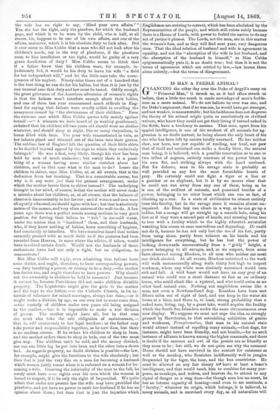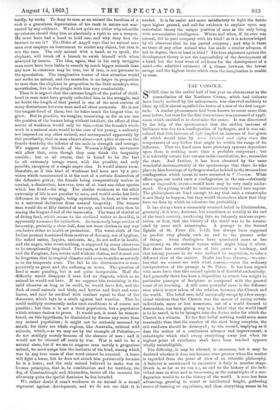IS MAN A FEEBLE ANIMAL ?
GLANCING the other day over the Duke of Argyll's essay on " Primeval Man," it struck us, as it bad often struck us before, that a little too much is made nowadays of man's feeble- ness as a mere animal. We do not believe he ever was one, and the Duke's argument, that if he was one, he would have got stronger, and not weaker, is unanswerable; but his feebleness does not disprove the theory of his animal origin quite so conclusively as civilized writers, who know they could not get their living if turned naked in the fields, have a tendency to assume. That man, apart from his special intelligence, is one of the weakest of all animals for ag- gression is no doubt correct, he being almost the only beast of his size who has been left by nature totally unarmed. He has neither claw, nor born, nor jaw capable of rending, nor hoof, nor paw that of itself and untrained can strike a deadly blow, the natural man being, it is believed, with a possible reservation as to one or two tribes of negroes, entirely unaware of the power latent in his own fist, and striking always with the hand unclosed. But for defence, man in his savage state is probably as well provided as any but the most formidable beasts of prey. He certainly could not fight a tiger or a lion or a panther or an elephant, but it is by no means clear that he could not run away from any one of them, being as he is one of the swiftest of animals, and possessed besides of a power, belonging to no other beast which can run as fast, of climbing up a tree. In a state of civilization he almost entirely loses this faculty, but in the savage state it remains almost un- impaired. An Eton boy can climb in a way, as he can go up a ladder, but a savage will go straight up a smooth bole, using his feet as if they were a second pair of hands, and crossing from tree to tree with a facility which to the highly educated naturalist watching him seems at once marvellous and degrading. Ile could not do it, because he has not only lost the use of his feet, partly from using shoes, partly from reliance on his hands and his intelligence for everything, but he has lost the power of looking downwards unconcernedly from a " giddy " height, a power belonging to all savages, and, as we suspect, from some facts observed among Hindoos, to all men who neither eat meat nor drink alcohol. At all events, Hindoos untrained to the work will walk unconcernedly along walls thirty feet high to inspect workmen, where any white man similarly untrained would turn sick and fall. A wild beast would not have an easy prey of an animal who could run a short distance as fast as an ordinary horse, who could climb like a squirrel, and who could swim as no other land animal can. Nothing not amphibious swims like a man, not even a Newfoundland dog. Kanakas have been met fifteen miles out of sight of land, and can keep in the water six hours at a time, and there is, at least, strong probability that a naked race, living, say, by a great lake, would acquire the facility which the South Sea Islanders under the same circumstances even now display. We suppose we must not urge the idea so strongly pressed by Hawthorne, in that astonishing exhibition of genius and weakness, Transformation, that man in his natural state would attract instead of repelling many animals,—that dogs, for instance, might have been friendly, and not hostile,—for no such instance of alliance is known among the higher mammals, and there is doubt if the marmot and owl of the prairie are as friendly as they seem to be ; but still, we do not quite see why the mammal Homo should not have survived in the contest for existence as well as the monkey, who flourishes indifferently well in jungles frequented by the tiger, the boar, and the boa constrictor. He must be allowed on any fair theory to* have at least a beast's intelligence, and that would teach him to combine for many pur- poses, as monkeys, and wolves, and beavers do, to attend to any signal of danger as a stag does—for though man has no scent, he has an intense capacity of hearing—and even to set sentinels, a " faculty," whatever its origin, which belongs, it is believed, to many animals, and is exercised every day, as all naturalists will
testify, by rooks. To deny to man as an animal the faculties of a rook is a gratuitous depreciation of his rank in nature not war- ranted by any evidence. We do not quite see either why scientific speculators should deny him so absolutely a right to use a weapon. He must have had a hand to hold one, and why deny him the instinct to use it? The Duke of Argyll says that no animal save man ever employs an instrument to realize any object, but that is not the case. The only animal with a hand, so to speak, the elephant, will break off a branch to swish himself with when annoyed by insects. The idea, again, that in his early struggles man must have been liable to assault by much bigger animals than any now in existence may be true, but if true, is not germane to the speculation. The imaginative horror of that situation would not strike an animal, and the mastodon is no larger in proportion to man than the elephant in proportion to the little monkeys who, nevertheless, live in the jungle with him very comfortably.
Then it is argued that the extreme length of the period of child- hood in man must have greatly enfeebled him in the struggle, and no doubt the length of that period is one of the most curious of many distinctions between man and all other mammals. He is not the longest-lived of them, but he takes much the longest time to grow. But in practice, we imagine, conceiving as far as one can the position of the human being without intellect, the effect of that source of weakness would only be this,—that the female's whole work in a natural state would be the care of her young, a necessity not imposed on any other animal, and accompanied apparently by this peculiarity, that in man almost alone—not quite alone—is the female decidedly the inferior of the male in strength and courage. We suppose our friends of the Women's-Rights movement will allow that, even though they may think the inequality curable ; but at all events, that is found to be the fact in all extremely savage races, with the possible, and only possible, exception of a single negro clan. It would almost seem, therefore, as if this kind of weakness had been met by a pro- 'vision which counteracted it at the cost of a certain diminution of the defensive power, the female being comparatively useless in combat, a diminution, however, true of at least one other species which has lived—the stag. The similar weakness at the other extremity of life is not peculiar to man, and would make but little 'difference in the struggle, being equivalent, in fact, at the worst to a universal deduction from natural longevity. The human race would die at fifty instead of seventy, and would even then be among the longest-lived of the mainuralia. The want of clothes or of fitting food, which seems to the civilized writer so dreadful, is apparently no reason for extinction. An immensely large section of humanity, probably a clear half, does not wear clothes in any way conducive either to health or protection. The waist-cloth of the Indian peasant is assumed from motives of decency, not of hygiene, the naked castes, faquirs, muhunts, &c., do not suffer in health, and the negro, who wears nothing, is supposed by many observers to be exceptionally long-lived. Two races, at least, the Tasmanians and the Fuegians, face severe cold without clothes, and it must not be forgotten that in tropical climates cold seems to strike as severely as in the temperate zone. The fall in the thermometer is com- paratively as great and the suffering as acute. The question of food is more puzzling, but is not quite insuperable. Half the difficulty would disappear if man had no disgusts, which as an animal he would not have. If we suppose him remaining in the mild climates as long as he could, he would have fish, and the flesh of small animals and birds, and berries and fruit and some leaves, and may be credited with instinct equal to that of the dormouse, which lays in a stock against bad weather. That he could multiply enormously under such conditions is of course not possible ; but then it is not a thick population, bat a population which science desires to prove. It would not, it must be remem- bered, on this hypothesis, be diminished by disease any more than any animal population ; it might not be seriously menaced by attack, for there are whole regions, like Australia, without wild animals, which,—as we may see by the example of Palestine,— do not multiply merely because of the absence of men ; and it would not be thinned off much by war. War is said to be a natural state, bat if we are to suppose man merely a gregarious animal, we must assign him the instincts of his kind, among which war in any true sense of that word cannot be counted. A horse will fight a horse, but he does not attack him persistently because he is a horse ; and the only animal believed to make war on human principles, that is, in combination and for territory, the dog of Constantinople and Alexandria, leaves off the moment his adversary quits the special dominion he has invaded.
We rather doubt if man's weakness as an animal is a sound argument against development, and we do not see that it is
needed. It is far easier and more satisfactory to fight the battle upon higher ground, and call for evidence to explain upon any materialist theory the unique position of man as the only being with accumulative intelligence. Where and when, if he ever was animal, did he part company with his kind ? as it is acknowledged by all observers that he has parted company; and why is there no trace of any other animal who has made a similar advance, if not in degree, then at least in kind ? The true argument against the development theory is not the impossibility of the development of a hand, but the total want of evidence for the development of a mind—the admitted existence of a. chasm between the lowest savage and the highest brute which even the imagination is unable to cross.































 Previous page
Previous page